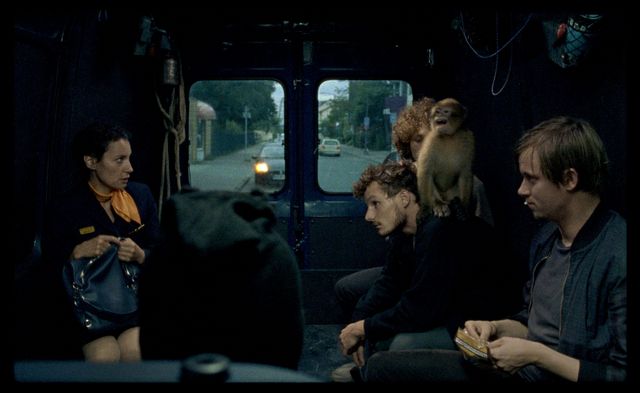[This is the third in a series of dispatches relating to the New Directors/New Films series, running between March 23, 2011 and April 3, 2011 at MOMA and the Film Society of Lincoln Center.]
Last August, JetBlue flight attendant Steven Slater decided to quit his job after a passenger refused to sit down. “I’ve been in the business 20 years,” he was alleged to have said. “And that’s it. I’m done.” He grabbed two Blue Moon beers, told the passengers to go fuck themselves, inflated the emergency slide, and walked away from the plane. A few hours later, he was arrested at his Queens home.
It’s doubtful that Pia Marais’s At Ellen’s Age – which played the Locarno Film Festival slightly before the JetBlue ballyhoo – was inspired by the Slater story. But there are a few interesting similarities. Ellen (Jeanne Balibar) is a flight attendant over forty who learns that her partner Florian (Georg Friedrich) has knocked up another woman. One day, with the camera tight on Ellen as she’s demonstrating emergency procedures and with only one boy craning his head around the edge of the seat to observe her, Ellen decides to exit the plane. Later, when the airline lets her go, Ellen’s boss explains that the lost profits and the security breach makes her continued employment with the airline untenable. Ellen, like Slater, defends her twenty years in the business. She then begins a journey of aimless wandering and inhabiting, not unlike Lost in Translation‘s Bob Harris (but without the wealth or the fame). She kicks around in random hotel rooms, hitting listless parties and often hiding in bed after everyone has left. She becomes an unexpected surprise for room service and for the next guest checking into the room. Through a series of odd run-ins, Ellen finds herself chasing a taxi that contains her luggage while inside a van containing animal rights activists. She ends up living with these activists, still wearing her flight attendant uniform as if it’s a skin that she can’t seem to shed.
The interesting juxtaposition of Ellen against animal rights activists suggests that Ellen herself might be a type of human animal. (And before she flees her job, it’s probably worth pointing out that she observes the surreal prospect of a cheetah walking down the runway and setting his haunches close to the plane’s wheels, causing a delay.) When the news outlets depicted the Slater tale, they invented a detail about Slater being in bed with his partner when the police arrested him. They were content to see Slater as a lurid animal to fit into their narrative cage. But the media isn’t terribly interested in Slater now and it never meaningfully examined why Slater did what millions of Americans wanted to do but couldn’t. When one aspect of our stability is threatened or removed, and we decide to roam the landscape that contains us, are we any more responsible in our actions than some grotty kid rightfully directing her energies towards capitalism’s many abuses, while failing to comprehend the exigencies of living with this shady social contract? There’s one moment in the film when Ellen finds herself protesting alongside her intrepid protesters. They strip their clothes off and spray something resembling blood on their bodies and wrap themselves in cellophane like meat. Is the protest here less about sticking up for animals and more about consumerism? Is not the chant MEAT IS MURDER a marketing cliché which might sit comfortably alongside JUST DO IT? Is not the decision to abandon one’s job as much of a capitalistic choice as sticking it out with the drudgery? These are interesting questions the film seems capable of, but that, frustratingly, aren’t buttressed by a cogent framework.
Yet Jeanne Balibar’s performance is to be commended here. As she gets further away from her ironically rooted career as a flight attendant, she almost lopes on-screen, like some animal released from captivity. She still resorts to the smile that she’s used for twenty years when taking in a young man named Karl (Stefan Stern) who thinks he can seduce her, but one gets the sense that this smile is hiding an additional layer of savagery. When Florian discovers just how thoroughly Ellen has rejected her former life, he is genuinely surprised. And so are we. But once the film has thrown Ellen so exquisitely into the wild, with Ellen even walking down a dark highway with liberated lab rats, At Ellen’s Age doesn’t quite have the philosophical heft to enter Levinas territory and raise vital questions about society’s responsibility for an impromptu Other like Ellen. That’s too bad. Because Balibar certainly has what it takes to go the distance.
